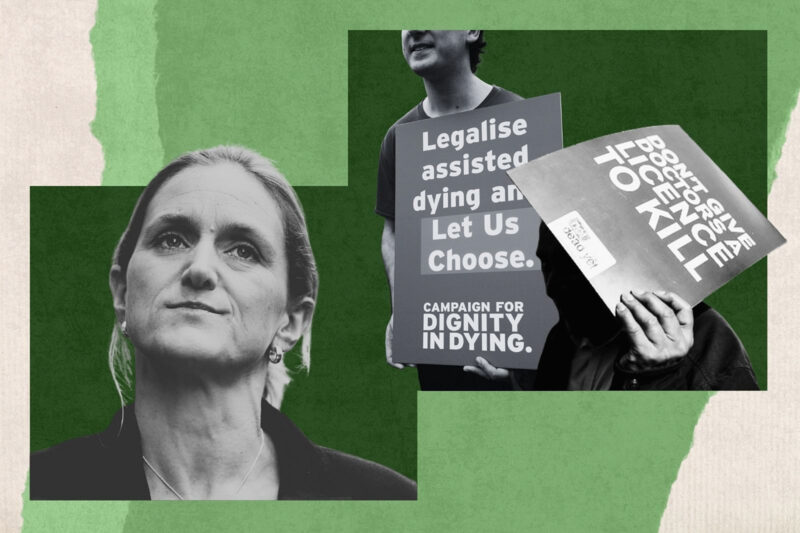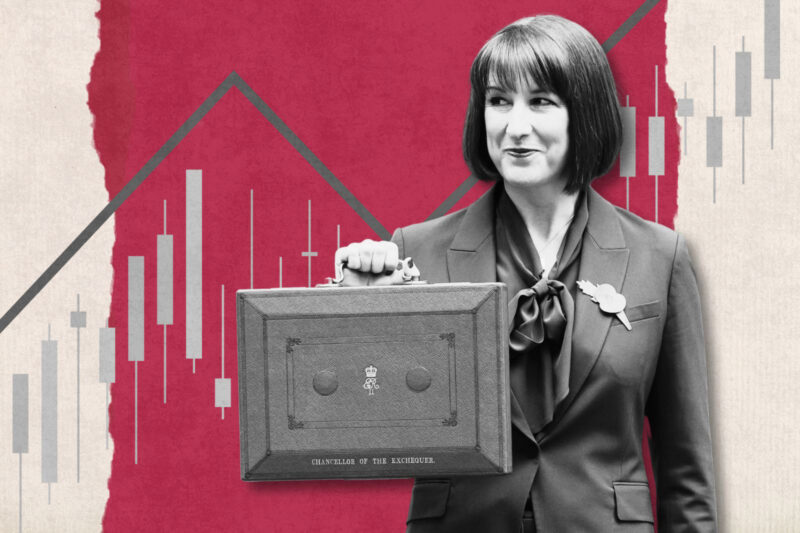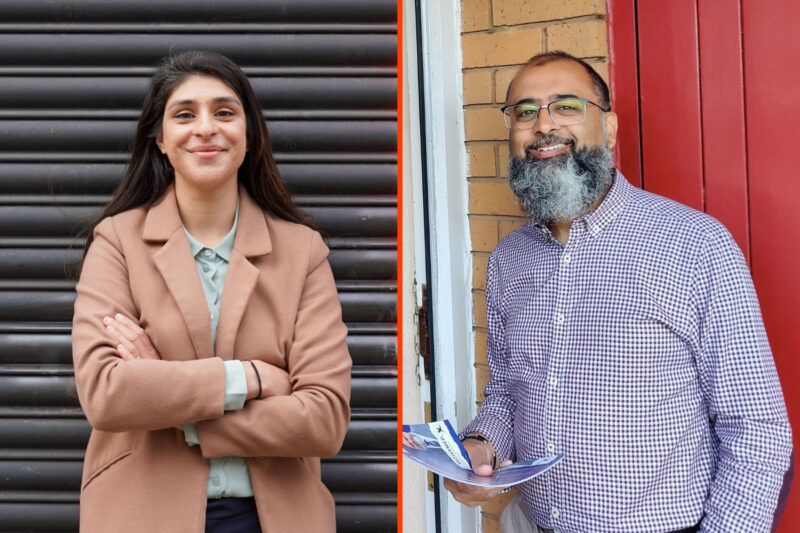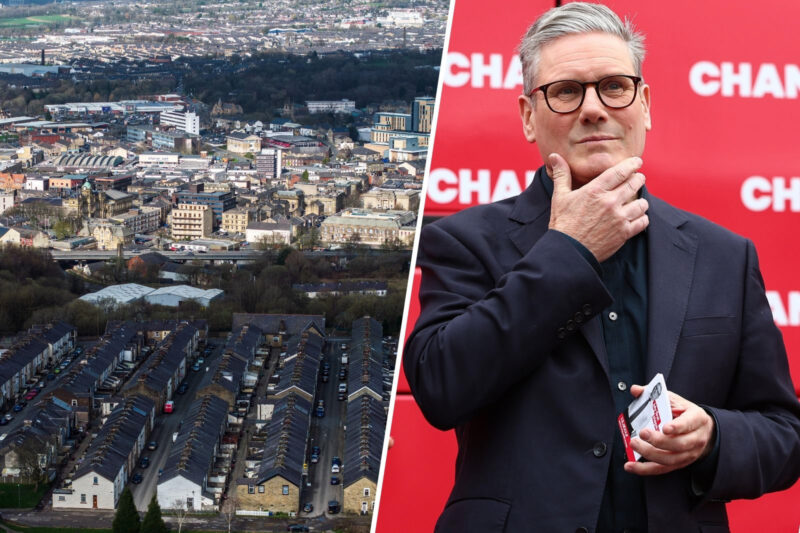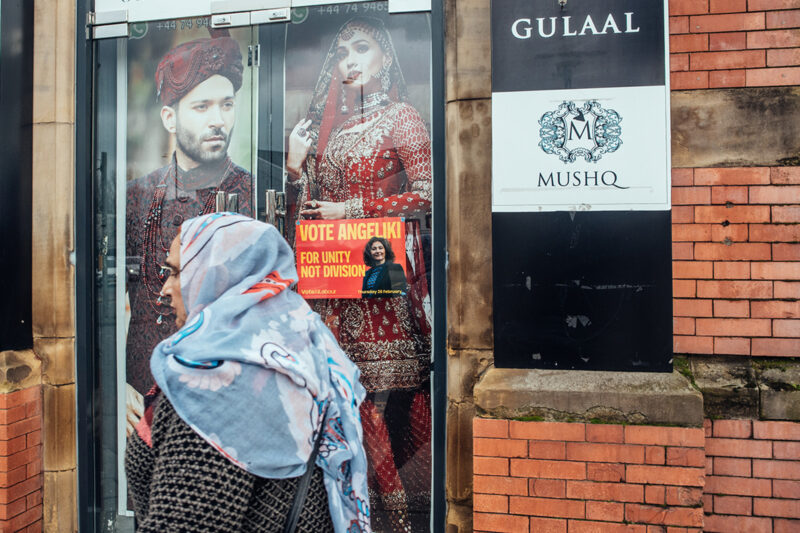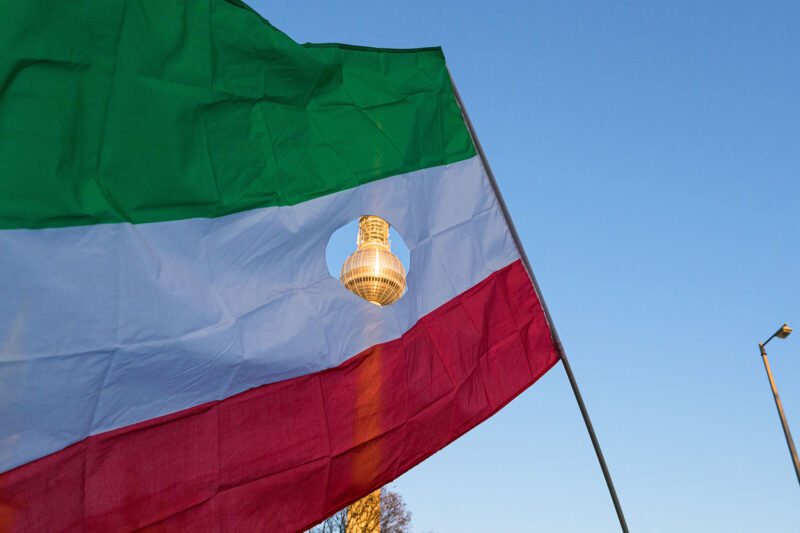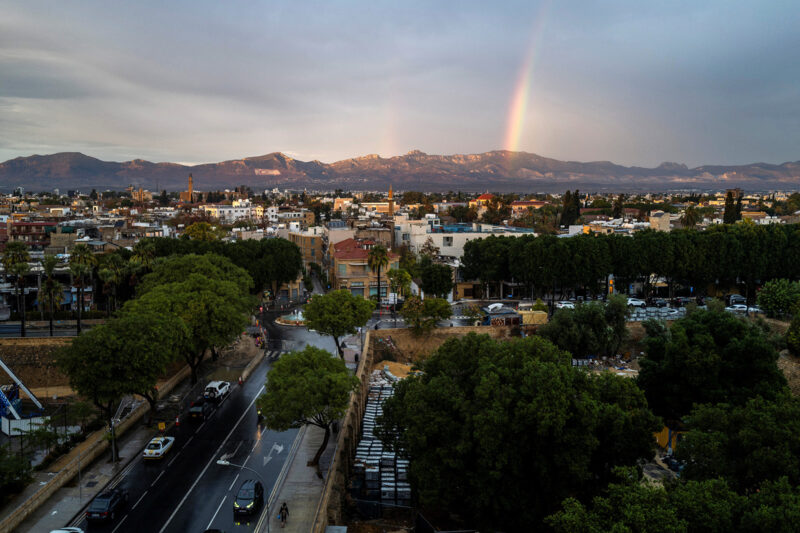There are Muslim bricks in Labour’s crumbling Red Wall
In 2019, the Labour party’s northern, white working-class base collapsed, handing a landslide election victory to the Conservatives. But are attempts to win those voters back alienating previously loyal South Asian supporters?

In Dewsbury, young women in hijabs stroll the open-air market, while shisha and shawarma shops sit next to cavernous fabric stores, selling colourful rolls of cloth. Tucked into the rolling hills of West Yorkshire, the town is blessed with landscapes that are the stuff of period TV dramas.
Dewsbury was also once home to many of the thriving northern English textile mills in which foreign workers — most from Muslim communities in Pakistan and India — were invited to take jobs in the 1950s and 60s. Now, according to local government data, those people and their families make up a third of its 67,000-strong population.
The town also provides a stark example of the collapse of the so-called Red Wall, a previously impervious northern voting bloc built over decades by the Labour party. In the 2019 general election, many once safe seats in England’s former industrial heartlands fell to Conservative candidates for the first time. That widespread overturning of deeply embedded political tradition secured Boris Johnson’s Conservative party its biggest win since 1987 — and Labour its worst defeat since 1935.
Many observers have said that political convulsion was set in motion by the 2016 referendum on leaving the European Union, which split Labour’s supporters down the middle. The widely accepted narrative is that the party’s older, whiter northern English voters opted to quit the EU, while younger, city-dwelling and minority voters chose to remain. Between Brexit and the plummeting stock of then leader Jeremy Corbyn, the scale of Labour’s general election losses left the party reeling.
But, by pinning the party’s defeat to a rightward shift in its white, working-class base and tailoring its policy decisions and rhetoric to winning back those voters, Labour appears to now be cutting itself off from people who did support it in 2019. British Muslims were once all but guaranteed to vote Labour. Now, many of the bonds between them and the party have unravelled.
Polling for the Labour Muslim Network in 2021 showed a drop of 12% in favourability ratings for the party since Keir Starmer took over as leader from Corbyn, after the party’s general election defeat. Meanwhile, according to polling from Muslim Census, Labour is at risk of losing half of its Muslim votes in the next national ballot. In the 2017 and 2019 elections, Labour secured 87% and 86% of the British Muslim vote, respectively. The Muslim Census online survey, which was carried out in January, states that if an election were to be held immediately, that figure would tumble to 38%.
Early one evening in April, I met up with Najam Sheikh, a 47-year-old human resources consultant and community organiser whose family came to Dewsbury from Pakistan in the early 1960s. He told me that, before 2019, “it was Labour, Labour, Labour and nothing else,” adding that “from our parents’ generation and as our communities have grown, it’s where our loyalties lie”.
But, now, as Tanisha Bramwell, a 27-year-old community activist who works with the area’s Muslim residents, explained, those generational voting patterns have fallen apart. We met in Dewsbury town centre after she had spent the day running a kids’ club tackling school holiday hunger and child poverty. “Lives are changing, livelihoods and family and religious attachments are all changing,” she said.
Bramwell, who has a Pakistani grandparent on each side of her family, stood for the first time in local elections last year as an independent candidate. She has since returned to Labour, but said that the party “makes an assumption that they have always had this vote and always will have this vote, but that is not the case at all.”
The relationship between British Muslims and the Labour party was never straightforward. Muslim communities arriving in Britain from the Asian subcontinent to alleviate postwar labour shortages in the 1950s were often introduced to the party through affiliated trade unions, active on the factory floors of northern mill towns such as Bradford, Oldham and Burnley. Loyalties were forged as Labour governments during the 1960s and 1970s were credited with making it easier — through Home Office policy and the work of constituency MPs — for the families of workers from Pakistan, India and elsewhere to join them in Britain.
But if arrival in the UK was made easier by Labour governments, life here was not. Several people I spoke to in Dewsbury recall the racism and hostility that was a feature of their early years in the country. Such discrimination was common across the north, especially in large cities like Bradford. After 18-year-old Gurdip Singh Chaggar and 24-year-old Altab Ali were killed in separate incidents of racist street violence in London during the 1970s, a nationwide network of Asian Youth Movements sprang up to guard against such attacks. During the 1970s, the fascist National Front marched in Dewsbury. On the same streets, local Muslims now tell me that they were targets of what they describe as “Paki-bashing” at school and racism at work.
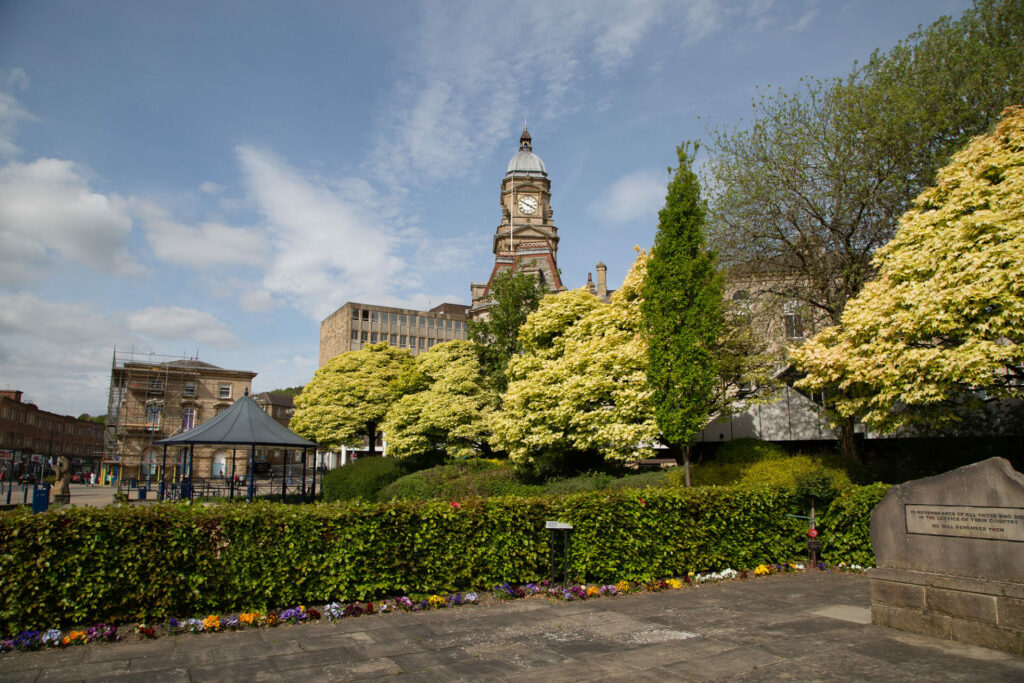
Photographed for Hyphen by Clare Hewitt
According to Faruk Pandor, a 52-year-old operations director at a catering supplies company and member of Dewsbury’s Friends of Al Aqsa, which campaigns for Palestinian human rights, the 1990s marked a change in the way Muslim communities were perceived and treated, which is largely attributed to generational shifts in attitudes to race and rising education levels.
“It seemed like we had turned a corner and could be regarded as equal citizens of this country,” he said.
But those sentiments evaporated after 9/11, the US and UK-led invasions of Iraq and Afghanistan and the introduction — under a Labour government — of counter-terror measures that disproportionately targeted Muslims. During this period, Labour shifted to the right, under the leadership of Tony Blair and Gordon Brown, cleaving to a neoliberal doctrine of free-market economics. Many viewed the party’s new direction as style over substance, managerialism over radicalism. Put it all together and, for many British Muslims, said Pandor, a vote for Labour became “the lesser of two evils” and “no longer about a party that you feel represents you, or you see your values as aligned to”.
That appraisal of Labour rumbled on through Ed Miliband’s five-year leadership. Then, in 2015, Jeremy Corbyn came along. An anti-war socialist with a firm stance against economic inequality, he allied with the Palestinian cause and had often publicly condemned the widespread Islamophobia of the time. Corbyn’s surprise leadership victory prompted an unparalleled surge in party membership and enthusiastic support from Muslim voters, but he was less well received by the press and some of his own party members.
Attacks against him were often launched by MPs from the centrist wing of Labour, who were apparently terrified of the implications of being led from the left. But Corbyn also made undeniable errors. Particularly damaging was his handling of antisemitism within the party. The Corbyn leadership was often dismissive, slow or contorted in its response to complaints, such as those that followed former Labour London mayor Ken Livingstone’s 2016 claims of Nazi-Zionist collaboration.
An investigation of this period from the Equality and Human Rights Commission, released in late 2020, found the party had broken equality laws, including harassment and discrimination, over the issue of antisemitism. It described a culture within the party that “at best did not do enough to prevent antisemitism and, at worst, could be seen to accept it”.
Amplified by hyperbolic media commentary that regularly dominated the news cycle and compounded by Corbyn’s mismanagement, the issue escalated into a full-blown crisis. Also rocked by factional disputes and accusations of ineffectually fudging the party’s position on Brexit, Corbyn’s leadership came crashing down.
Despite winning the resulting party leadership contest on a ticket of policy continuity, Keir Starmer pivoted back to the managerial politics of New Labour, much to the dismay of the thousands of members who had recently joined the party — among them many young people affected by Britain’s stagnant economy of low-paid, insecure work, its inaccessibly priced housing market and the looming climate emergency.
According to Bramwell, the party’s leadership shift has been devastating to Dewsbury’s younger population, including young Muslims. “When Corbyn was leader, young people were so happy and planning on joining Labour one day,” she told me. “Now they don’t want to get involved in politics at all. It is heartbreaking to see. They feel they don’t matter and have lost hope in politics.”
Starmer’s stance on the Israel-Palestine conflict also indicates a significant change of position. In a speech to Labour Friends of Israel last year, he appeared to downplay Israel’s violation of Palestinian human rights, denounced boycotts of Israel and quoted former Labour prime minister Harold Wilson’s colonial reading of history, saying that the nation was founded by “social democrats who made the desert flower”. Last month, Starmer, a former human rights lawyer, set himself against a growing consensus within the global human rights community, including Amnesty and the Israeli group B’Tselem, by refuting the notion of Israel as an apartheid state.
Describing their alienation from the party, British Muslims I spoke to mentioned Starmer pulling out of a virtual iftar during Ramadan last year and the cited reason for his decision.
“Ramadan is a spiritual time for us. Starmer was invited to an iftar and didn’t come on the basis that one of the organisers is just not supportive of Israeli dates,” said Sheikh, referring to a boycott common among British Muslims, since many of the fruits exported from Israel are grown in illegal settlements. “That is a massive slap in the Muslim communities’ face and a massive slap to the Palestinian cause.”
When polled, 61% of Labour party members have said they support the wider boycott, divestment and sanctions movement against Israel.
‘Labour is focusing on a certain understanding of a Red Wall voter, a mythologised version’
Starmer has, understandably, been keen to tackle Labour’s antisemitism problem, but accusations of Islamophobia within the party have not been taken as seriously. Last year, a survey from the Labour Muslim Network found that one in four members said they had direct experience of Islamophobia within Labour party circles, while one in three said they had witnessed it.
As a strategy to win back Red Wall seats, Starmer has focused on patriotism, national security and policing. Focus grouping has identified a tendency towards social conservatism among white, working-class voters in such areas, and the Labour leadership has responded by signalling that the party shares those values. Last year, a leaked strategy document revealed plans to deploy flags, military veterans and formal dress to signal its commitment to the country. Such moves have further alienated sections of Labour’s voter coalition, including previously dependable Muslim supporters.
It is also questionable whether, even on its own terms, such an approach could work.
“People prefer those who are genuine about patriotism, not a replica,” said Eunice Goes, professor of politics at Richmond, the American International University in London. “Patriotic voters will far more likely trust someone who has always been consistent in their patriotic approach over someone who has arrived late to that party.”
Goes added that the leadership’s appraisal of Labour’s lost Red Wall voters is a problem in itself.
“Labour is focusing on a certain understanding of a Red Wall voter, a mythologised version,” she said, noting that the reality of the region is more complex and diverse.
It’s precisely that misreading of voters that has left Labour more vulnerable in dozens of marginal seats across the UK. While British Muslims make up less than 5% of the total population, according to research carried out by the Muslim Council of Britain ahead of the 2019 election, Muslim communities are of a size significant enough to potentially affect election outcomes in 31 marginal seats. In other words, there are Black and Brown bricks in the Red Wall.
Now, Tory politicians across the UK are aggressively courting Muslim voters. Before of the 2019 vote, Dewsbury’s Conservative candidate Mark Eastwood spoke about freedom and human rights at a local rally, held shortly after India stripped the largely Muslim state of Jammu and Kashmir of its autonomy. Claimed in full by both India and Pakistan but split between them, Indian-administered Kashmir has hosted a bloody armed rebellion against New Delhi since the 1990s. Of the 1.1 million British Pakistanis, the majority originate from the part of Kashmir governed by Pakistan.
Paul Bristow is the Conservative MP for Peterborough and chairman of the Conservative Friends of Kashmir, of which Eastwood is also a member. Bristow has carefully built a strong and highly visible relationship with his Muslim constituents. In October, he posted on Twitter that “Muslim values are Conservative values.” During Ramadan in April, he also announced he would be fasting for the first week, to “share part of the experience”.
None of this has been lost on Zarah Sultana, a Labour MP on the left wing of the party who has represented Coventry South since 2019. “Conservative MPs have recognised there is a vote there that they can take from the Labour party,” she told me, noting the tendency of MPs with significant Muslim populations in their constituencies to speak out about Islamophobia and violence against Muslims around the world.
“With Labour too often failing to take a stand or speak out, the Tories see an opportunity and their tactics work,” she said.
These outreach efforts are boosted by the diversity of the Conservative front benches, with two people of Muslim heritage — health secretary Sajid Javid and education secretary Nadhim Zahawi — in senior posts. To some, that might read as skin-deep in a party with such a terrible charge sheet of Islamophobia.
Just months ago, Conservative MP and former transport minister Nusrat Ghani said she had been demoted in 2020 because, according to a party whip, her “Muslimness” was “making colleagues uncomfortable”. The problem is so acute that a senior Tory peer, Sayeeda Warsi, has described it as “institutional”. And yet, Muslims pursuing political careers say they are finding footholds in the party.
I met Mohammed Laher at his office in Batley, a market town just two miles north of Dewsbury. He came a healthy second in May’s local elections and serves as a chairman of the area’s Conservative Association. A decades-long Labour member, he switched parties in 2007.
“With the Conservatives, it is possible to advance,” he explained.
Laher does not ignore that his party has a “moral issue” with Islamophobia, but believes that such views exist in Labour, too. “At least with the Conservatives, I know where I stand,” he said, adding that he hopes to bring change from within.
Meanwhile, the Conservative party is trumpeting its ability to provide funding for deprived areas that vote for it. Several Muslim Labour supporters I spoke to in and around Dewsbury said their new Conservative MP, Mark Eastwood, has brought £25 million worth of government investment to the town as part of a drive to boost local economies, create jobs and build new homes.
At a local level, the economic argument is taking hold, not least because, over the past 10 years, the Conservative government’s austerity programme has led to deep cuts to local services that have disproportionately hit Labour-run regions. Kirklees Council, the local authority for Dewsbury and the surrounding area, has reported that its annual budget has taken a hit of £200m since 2010.
In Dewsbury, people point to potholed streets and neglected neighbourhoods and say the Labour council has done nothing to help. But one Labour councillor, who asked not to be named, told me: “People think that we are out there setting priorities but we didn’t make the cuts.” Residents added that local authorities had been forced to prioritise statutory services, such as social care, child protection and safeguarding the vulnerable, over other matters.
Local political campaigns excoriating Labour’s track record can be effective, as the recently elected Conservative councillor in Blackburn, Tiger Patel, has shown. A viral video last year showed him walking through a dilapidated local park, promising change, if voters opted for the Conservatives. He succeeded in taking his seat from Labour, though the party still holds overall control of the local council.
Still, in Dewsbury, Sheikh disputes the idea that the disaffection of Muslim Labour voters might turn into support for the Conservatives. “You aren’t going to find me, my family or wider circle of friends ever voting Tory,” he said. “It’s Labour or nothing.”
The deciding factor, however, might turn out to be apathy, with disillusioned Labour supporters declining to vote at all and leaving the way clear for Conservative victories.
Keir Milburn, a lecturer in political economy at Leicester University and the author of Generation Left, a book that analyses a growing adoption of left-wing politics among young people, believes there is a serious flaw in Britain’s current political discourse, with neither main party speaking to the material concerns of voters facing an acute economic crisis.
“The message this is sending to people is, ‘Do not engage in politics,’ he said. “And that might well be what happens.”
The Conservatives are not the only ones attempting to pull Muslim voters away from Labour. Last year, the former Labour MP George Galloway caused upheaval in the by-election in Batley and Spen, which neighbours Dewsbury.
Labour’s Kim Leadbeater, sister of the constituency’s former MP Jo Cox, who was murdered by a far-right terrorist in 2016, scraped a win with a margin of just 323 votes. The party’s vote share dropped by 7.4%, largely because Galloway’s Workers Party, campaigning in Batley for the first time, managed to secure 8,000 votes, mainly from Muslim residents ready to give Starmer’s Labour party a bloody nose.
The by-election was marred by accusations of harassment and intimidation from Galloway’s campaign. Leadbeater was subjected to homophobic abuse on the streets and ended up canvassing with police protection.
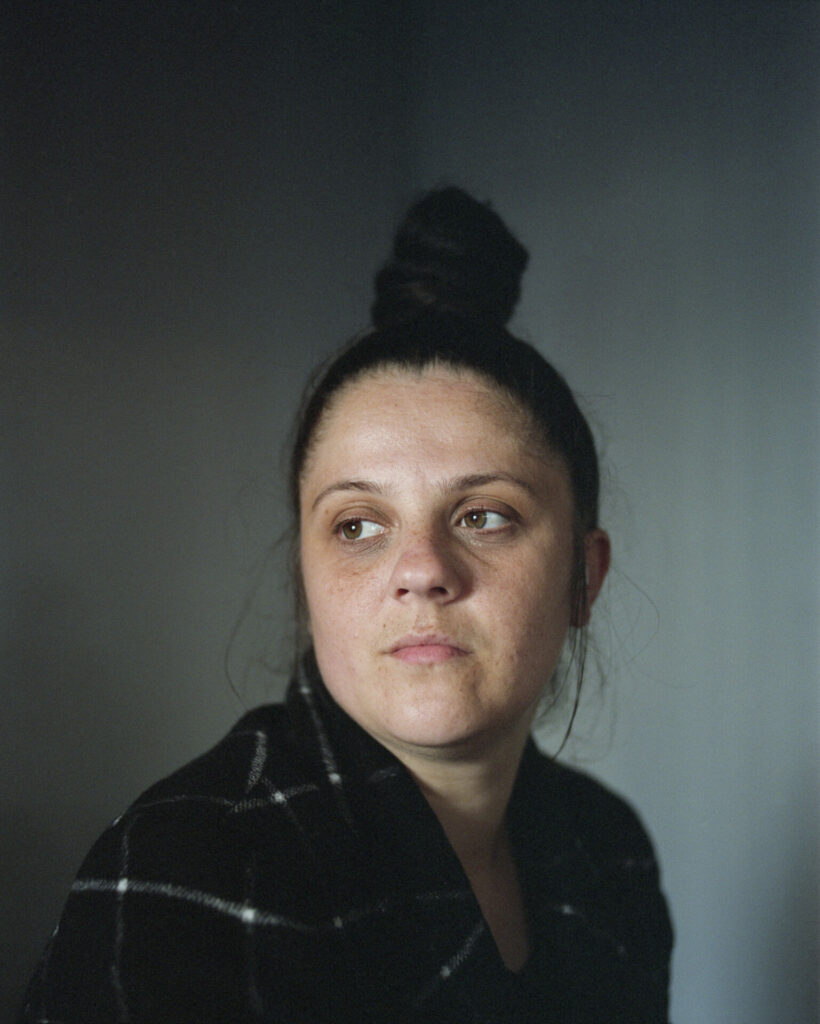
A year on, those events still fester. For Workers Party supporters, Batley was just the start. Several candidates represented the party in May’s local elections. Rehana Ismail, a 42-year-old public sector support worker and campaigner for Galloway’s party, told me: “I always supported Labour and now I feel the Workers Party is the ethos of Labour when it was set up, to help regular working people.”
Ismail also spoke of her time on the campaign trail with Galloway last year and the level of support for him from Muslims who previously voted Labour. In doing so, she highlighted another problem faced by major parties contesting seats in Red Wall areas.
“Lots of women really supported the campaign, but they never came out to leaflet or knock on doors,” she said. “The confidence isn’t there. They don’t want to put themselves in the firing line.”
Others believe that Muslim women are reluctant to participate in grassroots organising because of the toxic nature of political campaigning in the area today — including that of the Galloway camp. An open letter from a group of women writing anonymously during the Batley by-election condemned the “shameful” actions of a “loud minority” of men.
When Bramwell stood as an independent local councillor in Dewsbury last year, she was the target of appalling racism, homophobia and misogyny — coming, she says, from multiple political directions — which required police intervention and took a toll on her mental health.
According to Fatima Patel, editor-in-chief of the Asian Standard newspaper, which focuses on Britain’s South Asian community in the north, “These are intelligent, independent, confident women. They run businesses, homes and charities but just don’t want to get involved in what they view as dirty politics.” Like others I spoke with, Patel said that political parties have a serious problem if they cannot create safe spaces for everyone.
For some Dewsbury residents, briefings from the Labour party after its narrow election win in Batley last year have been especially alienating. A campaign source told a Times reporter that Labour had “lost the conservative Muslim vote over gay rights and Palestine, and won back a lot of 2019 voters,” adding that the result showed that Labour was “reconnecting with the wider electorate again”.
That message has lingered among many Muslims, horrified to hear that the party they have long supported now casts them as intolerant bigots and not part of the broader coalition of voters that the Labour party wants to reach.
“They are saying we are not the real electorate,” said Pandor. “They are saying they don’t want the Muslim vote.”
But, for Bramwell, now is not the time to disengage from Labour. “What is happening in this country right now needs to take priority,” she told me. With Britain reeling from the aftershocks of Covid-19 and buckling under a cost of living crisis that, according to the Guardian, is hitting Red Wall areas even harder than other parts of the country, she believes that the focus should be on removing a government reluctant to mitigate the effects on the most vulnerable people in society.
By focusing almost exclusively on pulling socially conservative voters in Red Wall areas back into the Labour fold, the party’s strategy has at its core the assumption that, come election time, it can take the bulk of progressive and minority votes for granted, because people will just want to kick the Tories out of power.
This strategy has worked before. After all, Tony Blair’s Labour party came to power in the late 1990s by appealing to a model aspirational, suburban voter who became known as “Mondeo Man”. But, said Goes, that is a big gamble in today’s context.
“The electorate has changed a lot in the last 30 years,” she explained. “It is much more volatile.” With the government rocked by political scandals, accusations of corruption and taking a Marie Antoinette approach to public hardship, the Conservative party took a hammering across England in May’s local elections. But it was mostly other parties — the Liberal Democrats, the Greens and independent candidates — that reaped the rewards, not Labour. (That said, Labour did take overall control of Kirklees Council, the local authority for Dewsbury).
If the electorate has changed since Labour was last in power, so too has the political climate. With wages flatlining and inflation spiralling, even people in work are now struggling to heat homes and eat regular meals. For many voters, it is clear that an economic system that is failing them so badly is in desperate need of a radical overhaul, yet Starmer does not appear to have a plan to undertake such a task.
Ultimately, it is actual economic policy — not flag waving and talk of patriotism — that could glue Labour’s voter coalition back together. By targeting only one particular kind of Red Wall voter, the party risks fracturing its broader base ever more deeply, despite the many fundamental concerns its members share.
As Pandor said of Labour’s once-stalwart Muslim voters: “We are from a working-class background as well. We live in socio-economically deprived communities in the north of England as well.”
 Newsletter
Newsletter



